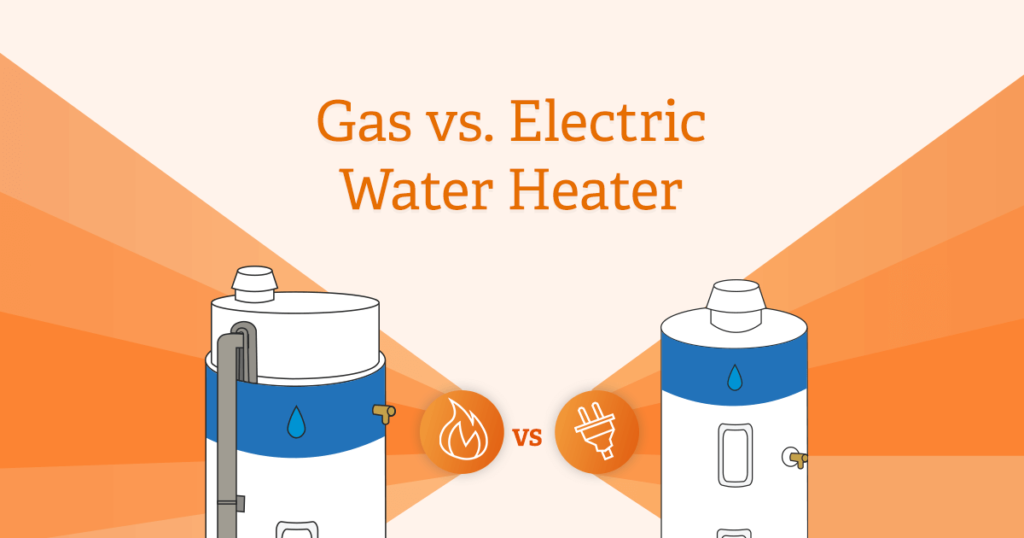When it comes to heating water in your home, choosing the right Gas vs Electric Water Heater is essential. The decision between a gas and an electric water heater might seem straightforward, but there are many nuanced factors that can impact your comfort, energy savings, and costs over time. Both types of heaters have their unique benefits and drawbacks, and understanding these “surprising” pros and cons can help you make a well-informed decision tailored to your home’s needs.
What is a Gas Water Heater?
Gas water heaters use natural gas or propane to generate heat. Inside a gas water heater, a burner ignites to heat up water in a storage tank or through a heat exchanger if it’s a tankless system. These heaters are popular for their fast heating capabilities and typically have lower energy costs when gas is more affordable than electricity in certain regions.
What is an Electric Water Heater?
Electric water heaters, on the other hand, use electric resistance coils or heating elements to warm the water. These units are easier to install and are often more energy-efficient in terms of output. They come in both tank and tankless versions, offering a versatile range of options for various household sizes and hot water needs.
Let’s dive into the surprising pros and cons of each to help you make the best decision.
The Pros of Gas Water Heaters
1. Faster Heating Time
Gas water heaters generally heat water much faster than electric heaters. This is because gas provides instant heat to the water as it burns, whereas electric elements take time to raise the temperature. This faster heating capability means less waiting around for hot water when you’re in a rush, which is ideal for large families or those who use a lot of hot water in a short period.
2. Better Performance in Cold Weather
In colder climates, gas heaters often outperform electric ones. They can keep up with higher hot water demand during the winter months without a noticeable impact on efficiency or performance, making them a more reliable choice for households in regions with cold weather.
3. Lower Operating Costs (in Some Areas)
Gas is often cheaper than electricity in many regions, especially where natural gas infrastructure is well-established. Because gas heaters operate faster, they can save homeowners on monthly energy bills compared to electric water heaters, particularly in households with high hot water usage.
4. Continues to Work During Power Outages
A big advantage of gas water heaters is their ability to work even during power outages, which is crucial for those in areas with unstable power supply. Since gas heaters rely on combustion rather than electrical resistance, they are a reliable backup for maintaining hot water access during blackouts.
The Cons of Gas Water Heaters
1. Higher Initial Cost and Installation Complexity
The upfront cost for a gas water heater, along with installation, is generally higher than for an electric unit. Installing a gas line or making modifications to existing lines can increase costs. Additionally, gas heaters require ventilation systems to safely expel exhaust gases, adding to the complexity and cost of setup.
2. Regular Maintenance Requirements
Gas water heaters require more frequent maintenance to ensure they run safely and efficiently. The pilot light, burner, and ventilation need regular inspection to prevent carbon monoxide leaks and maintain optimal performance. This maintenance factor can add additional time and cost for homeowners.
3. Higher Risk of Carbon Monoxide Leaks
Gas water heaters present a safety risk because they produce carbon monoxide as a byproduct of combustion. While this risk is mitigated with proper installation and maintenance, homeowners still need to install carbon monoxide detectors and ensure good ventilation to prevent potential poisoning hazards.
4. Not as Environmentally Friendly
Natural gas and propane are fossil fuels, and burning them contributes to greenhouse gas emissions. Even though gas heaters might be more efficient in some areas, they still have a higher environmental impact compared to electric heaters, which can run on renewable energy sources.
The Pros of Electric Water Heaters
1. Easier and Cheaper Installation
Electric water heaters are generally easier and cheaper to install than gas units. They don’t require venting or a dedicated gas line, making installation quicker and simpler. This is an attractive factor for homes that lack a gas infrastructure or for those looking for a more affordable initial investment.
2. Higher Energy Efficiency
Electric water heaters are known for their energy efficiency because they convert almost all of the energy they consume directly into heat. With no energy lost to exhaust, electric models tend to be more efficient at converting energy into hot water, making them ideal for eco-conscious homeowners.
3. Less Maintenance and Fewer Safety Risks
Compared to gas water heaters, electric models are generally safer and require less maintenance. There are no combustion or ventilation needs, which reduces the risk of gas leaks or carbon monoxide buildup. This makes electric heaters a safer choice for homes, especially in enclosed spaces or areas where ventilation is limited.
4. Compatible with Renewable Energy Sources
Electric water heaters can easily be integrated into a home’s renewable energy system, such as solar or wind. As the world moves toward cleaner energy sources, having an electric heater makes it easier to transition to renewable energy, reducing your carbon footprint and environmental impact.
The Cons of Electric Water Heaters
1. Slower Heating Time
Electric water heaters are generally slower to heat up water than gas models. This can be inconvenient if you have a large household with high hot water needs, as it may take longer to replenish hot water once it’s used up.
2. Higher Operating Costs (in Some Areas)
Electricity can be more expensive than natural gas in certain regions, which means that electric water heaters might have higher monthly operating costs. This difference can add up over time, especially if your household has a high demand for hot water.
3. Affected by Power Outages
Electric water heaters are completely reliant on electricity to function, so they won’t work during power outages. This can be a major disadvantage in areas prone to electrical outages, as it can leave households without hot water when it’s most needed.
4. Higher Environmental Impact if Using Non-Renewable Energy
While electric water heaters can be paired with renewable energy, if your local grid primarily relies on fossil fuels, running an electric water heater might indirectly contribute to higher carbon emissions. In regions with cleaner energy sources, this isn’t as big of a drawback, but it’s worth considering.
Gas vs. Electric Water Heater: Which One Should You Choose?
Ultimately, the decision between a gas and electric water heater depends on a few crucial factors:
- Energy Cost in Your Region: Gas water heaters may be more cost-effective in areas with low gas prices, while electric heaters may be a better choice where electricity is cheaper or can be sourced from renewables.
- Household Hot Water Demand: For homes with high hot water demand, a gas water heater’s fast recovery rate could be beneficial. If you have a smaller household or lower water demand, an electric water heater might serve you just fine.
- Environmental Impact: If reducing your carbon footprint is a priority, an electric heater connected to a renewable energy source is the greener option. Gas heaters, while efficient, still rely on fossil fuels.
- Installation Budget and Space Considerations: Gas heaters are more expensive to install and require ventilation space, so if you’re working with a tight budget or limited installation area, an electric water heater might be the way to go.
- Maintenance Commitment: If you prefer low-maintenance appliances, electric water heaters are simpler and less time-consuming to upkeep. Gas heaters need more frequent maintenance, especially with the added safety checks required for combustion appliances.
Conclusion
Choosing between a Gas vs Electric Water Heater isn’t a decision to be taken lightly, especially when each has surprising pros and cons that could significantly affect your home’s energy efficiency, costs, and safety. Gas water heaters offer faster heating, lower operating costs in some regions, and work even during power outages, but they come with higher installation costs and require regular maintenance. Electric water heaters, on the other hand, provide easy installation, high efficiency, and compatibility with renewable energy sources, but they tend to heat more slowly and can be impacted by higher electricity costs.



